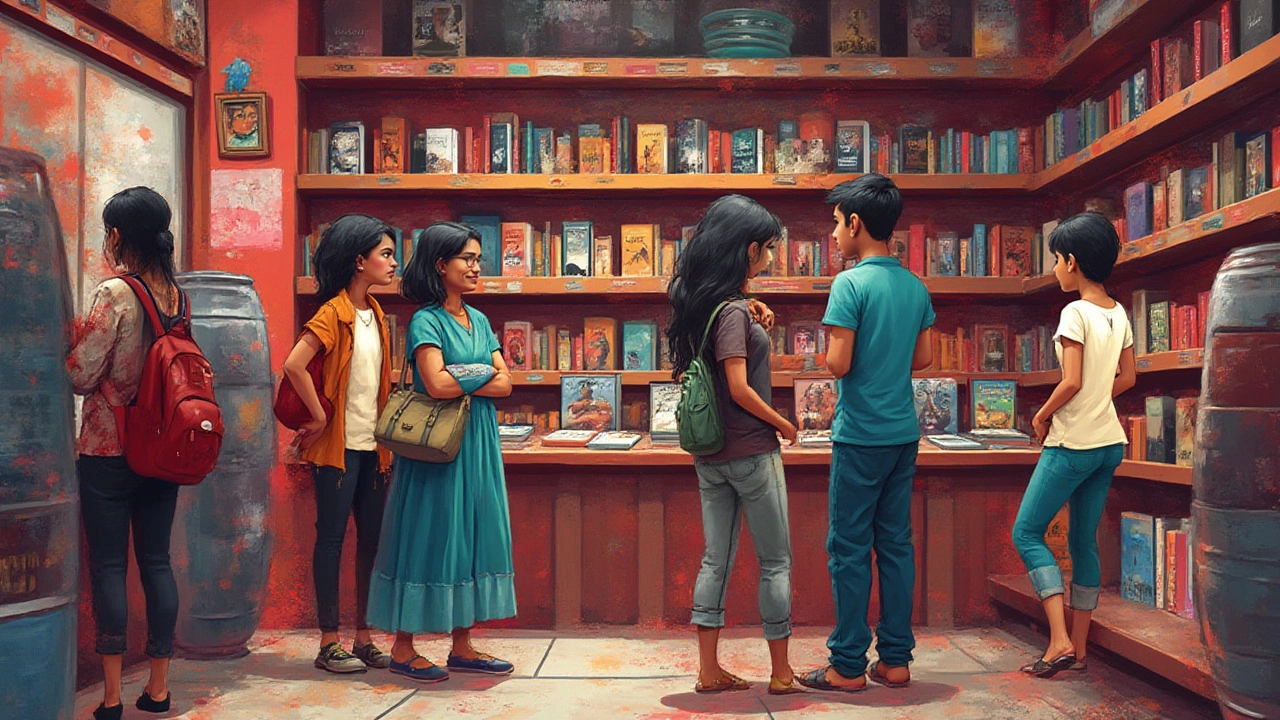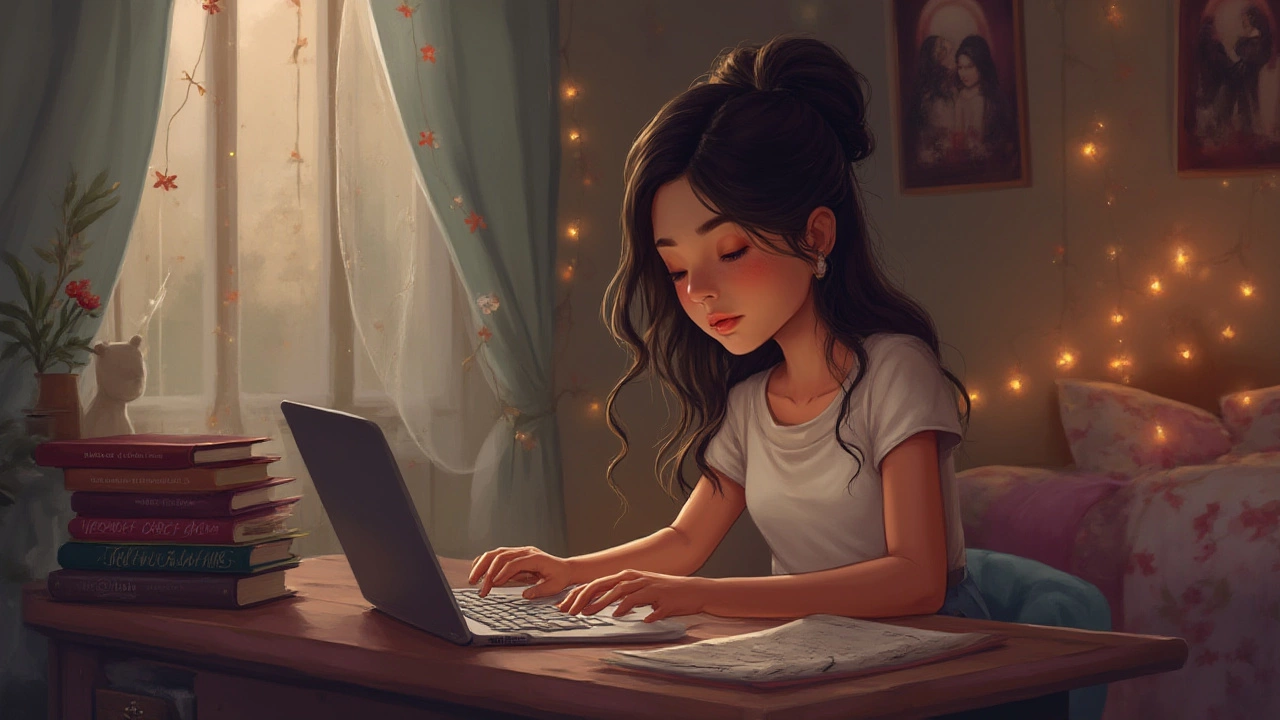What do you get when vampire romance crashes into erotic fiction? A bestseller that’s hard to ignore. The massive success of "Fifty Shades of Grey" didn’t just shake up the romance genre, it sent ripples through pop culture and publishing. But here’s something you might not know: this infamous trilogy wasn’t born in a vacuum. If you look into the literary DNA of 50 Shades, you’ll find a story about obsession, transformation, and the unexpected paths fandom can open. Let’s untangle the real story behind its blazing beginnings.
The Twilight Connection: From Fandom to Bestseller
If you heard whispers about "Fifty Shades of Grey" starting as fanfiction, you heard right. E.L. James first released her story online, under the title "Master of the Universe" – and it wasn’t about Christian and Ana. Instead, readers swooned over two unmistakable characters: Edward Cullen and Bella Swan from Stephenie Meyer’s Twilight series. James, like so many caught up in Twilight mania back in the late 2000s, reimagined the chemistry and tension between the leads, just with less sparkle and a lot more heat.
The fanfic community on sites like FanFiction.net was thriving at the time. "Master of the Universe" gained millions of hits. But the explicit content (let’s be honest, it was a lot spicier than Twilight ever got) meant James’s story eventually had to leave public fanfiction platforms. Wanting to give her creation new life, she changed the names, tweaked some details, and hit 'publish' on her own website. Later, she self-published the novel as "Fifty Shades of Grey." The rest, as they say, is history.
Calling 50 Shades a simple Twilight knockoff isn’t fair, though. James used the bones of Meyer's dynamic, but the heart of the story – the elaborate world of dominance, submission, and red rooms – belongs to her own imagination. Still, without Bella and Edward blazing that trail, Christian and Ana probably wouldn’t even exist.
How Fanfiction Shaped Modern Publishing
Here’s a stat that might surprise you: over 2 million Twilight fanfics exist online. Most gather a small following and disappear, but sometimes a story strikes gold. "Fifty Shades of Grey" wasn’t the only breakout, but it is the most famous—and profitable. The book’s rise showed just how powerful fan communities could be in today’s publishing world.
When 50 Shades exploded, publishers and agents suddenly had their eye on online writing scenes, hunting for the next viral hit. New York’s big five publishing houses, once notorious for ignoring fanfic, were now scouting Wattpad and FanFiction.net. Self-publishing, once a last resort, gained real respect. In fact, several other fanfic-to-novel successes—like Anna Todd’s "After" (originally Harry Styles fanfiction)—trace the same path. The walls between “serious” literature and passion-fueled fandom stories had started to crumble.
Let’s put some numbers to that. The 50 Shades trilogy sold over 150 million copies worldwide—a figure that puts it on the same level as The Lord of the Rings and Harry Potter. Movie deals, merchandise, spinoffs, and new editions popped up overnight. All this began with a woman writing scenes for a devoted, but niche, online readership. If you’re a writer wondering if what you post on forums could ever be worth something, 50 Shades says: never say never.

E.L. James: The Author Behind the Sensation
Living in London, working in television production, and parenting two sons, E.L. James (whose real name is Erika Mitchell) was hardly your typical debut novelist. She wanted to see her version of a grown-up, twisted romance—something mainstream publishing just wasn’t delivering at the time. She started "Master of the Universe" as a fun hobby, but never imagined it’d end up setting sales records.
Once Fifty Shades went viral, Mitchell hit more than just sales jackpot. She faced a storm of criticism and curiosity. Some called her writing clumsy. Others said her characters glamorized unhealthy relationships. But even her harshest critics couldn’t slow the tidal wave of readers. By 2012, James was on Time magazine’s list of the world’s hundred most influential people. She rode the wild wave with humility, always crediting the Twilight books for sparking her creative itch.
James gave countless interviews about her writing process. She famously wrote on her BlackBerry, grabbing spare minutes during commutes and after the kids went to bed. She answered fan emails herself. She’s often said if not for Meyer’s Twilight and the excitement of sharing stories online, she might never have written a book at all. James later published spin-offs, including stories told from Christian’s point of view, but none captured lightning quite as powerfully the first time around.
Controversies and Cultural Impact
50 Shades didn’t just sell—it sparked more heated debates than any recent romance novel. Critics slammed its depiction of BDSM relationships, worried it gave readers the wrong idea about consent and healthy sexuality. Activists, including those from within the BDSM community, emphasized that Ana's experiences didn't follow the communication-heavy practices real couples use. It wasn’t just about handcuffs and silk ties; it was about whether the story dealt responsibly with power and agency.
Despite the backlash, 50 Shades brought taboo topics out of the shadows. Bookstores, once shy about “adult” novels, built displays taller than you. People read it on their morning train, hidden behind tablets or peeking out of gym bags. Entire book clubs formed just to debate Christian Grey. Some called it "mommy porn," a term that’s equal parts dismissive and underselling. But one thing’s certain: it cracked open conversations about sex, fantasy, and women’s desires in ways most books never do.
By the time Universal Pictures released the first film in 2015, 50 Shades had become a full-blown phenomenon. The franchise made over $1.3 billion at the global box office, even while reviews stayed mixed. Suddenly, dominant male leads and forbidden passion filled romance shelves everywhere. Other authors, noticing the trend, made BDSM and billionaire heroes household staples in the years following.
| 50 Shades Trilogy | Years Published | Copies Sold |
|---|---|---|
| Fifty Shades of Grey | 2011 | Over 150 million (trilogy total) |
| Fifty Shades Darker | 2012 | |
| Fifty Shades Freed | 2012 |

Writing Your Own Story: Lessons from 50 Shades’ Success
So, what can anyone inspired by 50 Shades of Grey learn? For starters, big ideas can grow from unexpected places. James started out just wanting to write fun, sexy scenes featuring her favorite characters. Her willingness to take risks and put her work out there, even if it got backlash, won her millions of loyal readers. If you’re secretly writing fanfiction, there’s no shame in it—some of the world’s biggest books did too.
If you want your stories to reach people, here are a few real-world lessons:
- Don’t be afraid of feedback, both good and bad. James received plenty of both, but kept refining her work.
- Listen to your audience. The reason Master of the Universe took off is that readers kept asking for more, and James listened.
- Know when to revise. Turning the fanfic into a novel meant changing character names, plot elements, and ensuring original worldbuilding.
- Be ready for controversy. If you hit a nerve, prepare for heated debate—sometimes, controversy sells.
- Trust your passion. Writers in the fanfic world often pen stories for nothing but their own joy. If you love it, someone else probably will, too.
The literary world is a lot weirder and more unpredictable than anyone admits. Next time you hear someone dismissing books that started as fanfiction, remind them: almost nobody saw it coming, but sometimes that’s exactly how a publishing revolution starts. "Fifty Shades of Grey" may have borrowed its bones from Twilight, but it went places nobody expected—and that’s where things always get interesting.

